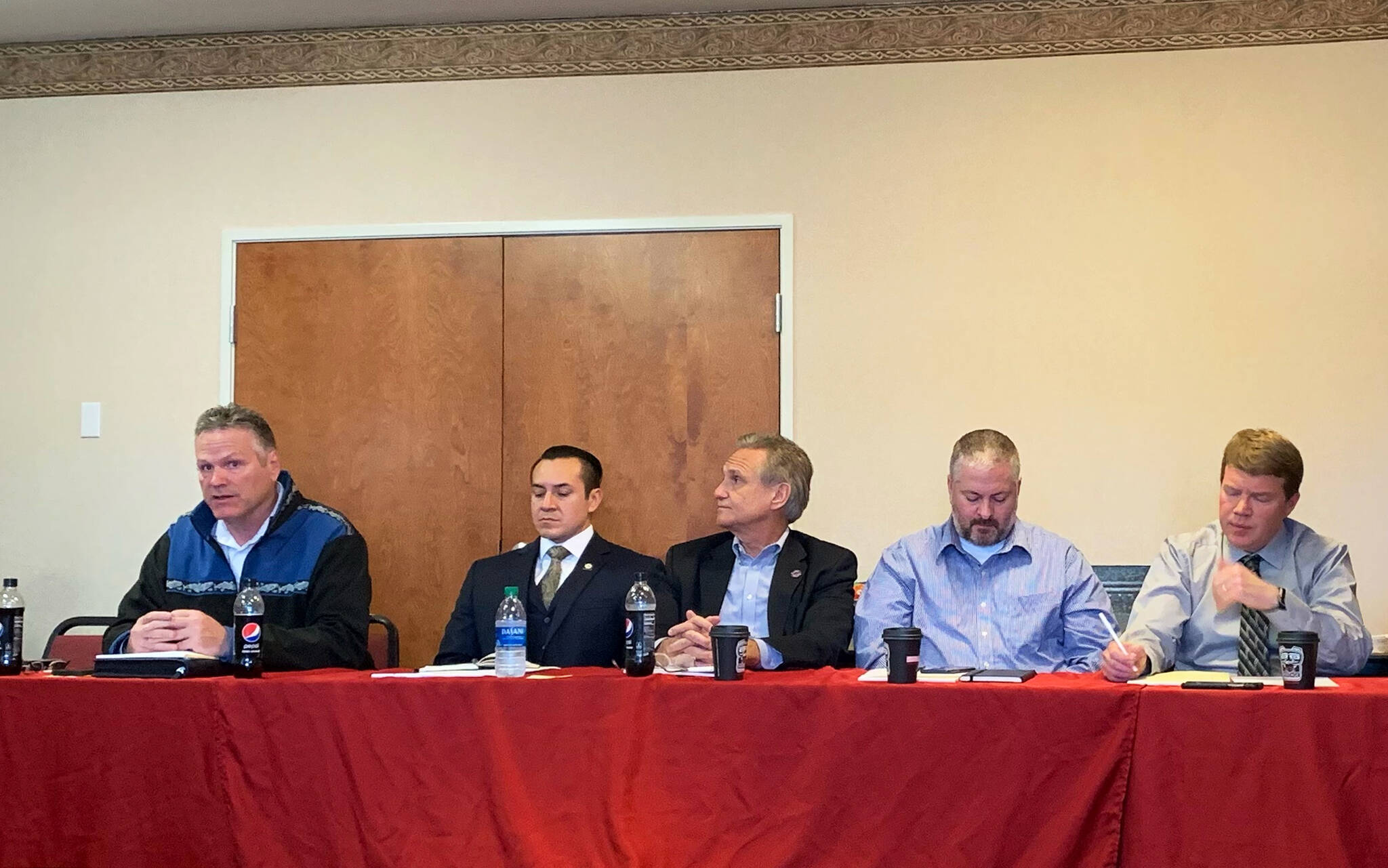Soldotna’s Aspen Hotel hosted Gov. Mike Dunleavy and members of his cabinet Tuesday morning, when the group convened for a routine meeting. The meeting was the first gubernatorial cabinet meeting to be held on the Kenai Peninsula, according to Dunleavy’s Deputy Communications Director Jeff Turner.
The meeting followed visits by Dunleavy to Marathon Petroleum Refinery in Nikiski and Kenai Peninsula College’s Process Technology Center on Monday. Dunleavy fielded questions from local media outlets ahead of the cabinet meeting.
COVID-19
When asked about the impact COVID-19 is having on the central peninsula’s health care entities, Dunleavy attributed the current surge in COVID-19 cases in the state to the highly transmissible delta variant and emphasized the early lead Alaska took in distributing vaccines and monoclonal antibody treatments. He added that the state is working continually to make those treatments available to Alaskans infected with COVID-19.
“We are having high cases right now because of this delta variant, no doubt about it,” Dunleavy said.
Alaska Department of Health and Social Services Commissioner Adam Crum said he toured Central Peninsula Hospital, including the hospital’s intensive care unit, for about an hour and a half on Monday. Crum said CPH has seen a lower staff turnover rate than other facilities in the state.
“The overall morale, while stressed, was much better than some of the other hospitals,” Crum said of his visit to CPH. “It’s a tremendous job just for all the staff that are working and that are trying to take care of these patients.”
Dunleavy announced last week that the state of Alaska would be contracting hundreds of health care workers from the Lower 48 to help expand the state’s health care capacity and relieve front-line workers. Crum said Tuesday that the first group of 100 workers are expected to arrive in Alaska on Wednesday, and will be dispersed to hospitals in Anchorage and the Matanuska-Susitna boroughs.
CPH External Affairs Director Bruce Richards confirmed Tuesday that Crum toured the hospital Monday and said that CPH will be in the mix to receive additional health care workers from the hundreds arriving from the Lower 48.
As of Tuesday, CPH was operating at 116% capacity, with 57 beds in use. The hospital is licensed for 49 beds, but has moved into surge space and has some patients “doubled up” in rooms. As people are discharged, Richards said, patients are moved from overflow spaces into standard beds.
Richards said that while the mood among CPH’s health care staff seems to be “uplifting,” extra help in the form of more health care workers would be appreciated, especially by employees working overtime or working double shifts.
“Like everybody, they’re tired of COVID,” Richards said.
The meeting came on the heels of the announcement of over 4,000 new cases reported in Alaska over the weekend and 726 reported on Tuesday. The Tuesday numbers include 10 cases reported in Kenai, nine cases in Seward, eight in Homer, six in Anchor Point, four in Soldotna, three in Nikiski, two in Kenai Peninsula Borough North and one each in Fritz Creek and Sterling.
The legislature and PFD
Of the Legislature’s upcoming special session — its fourth this year — Dunleavy said he hopes that a plan created by a legislative working group meant to address the state’s financial problems can act as a starting point. The Legislature approved a bill outlining an $1,100 PFD hours before the end of the third special session, an amount Dunleavy has already said he will not veto despite wanting it to be closer to $2,300.
“This is the time to assist the people of Alaska and, more importantly, this is the time to get this full fiscal plan done,” Dunleavy said. “We believe that the Legislature knows what needs to be done.”
The Legislature’s fourth special session was initially scheduled to begin this Friday, but the governor’s office announced this week that the start would be pushed back to Monday.
Dunleavy said Tuesday he hopes multiple special legislative sessions does not become standard practice for Juneau, but rather a response to the “anomaly” of Alaska’s financial problems.
“Once we get this issue settled, I think what we’ll see is a return to what is considered to be ‘normal sessions,’ working on education, working on investment, working on roads, working on things like that,” Dunleavy said. “This has been a large, large boulder in the middle of the road that has prevented us from having normal sessions.”
Reach reporter Ashlyn O’Hara at ashlyn.ohara@peninsulaclarion.com.


